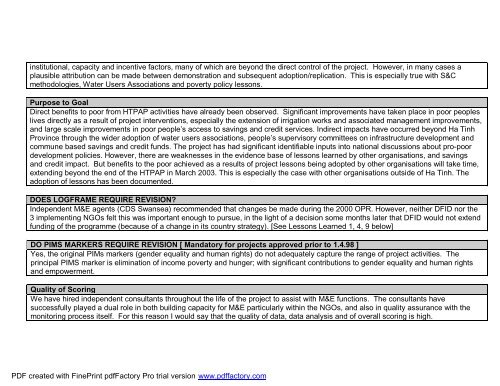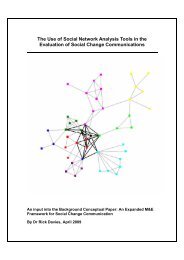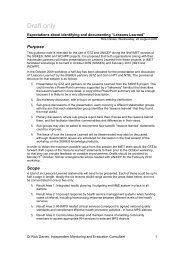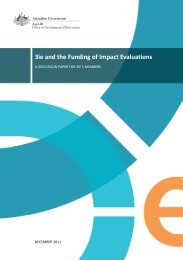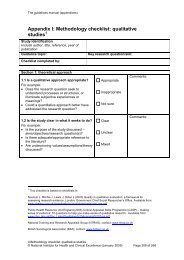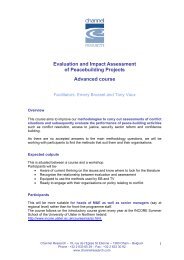DFID 2003 Ha Tinh PCR.pdf - Monitoring and Evaluation NEWS
DFID 2003 Ha Tinh PCR.pdf - Monitoring and Evaluation NEWS
DFID 2003 Ha Tinh PCR.pdf - Monitoring and Evaluation NEWS
You also want an ePaper? Increase the reach of your titles
YUMPU automatically turns print PDFs into web optimized ePapers that Google loves.
institutional, capacity <strong>and</strong> incentive factors, many of which are beyond the direct control of the project. However, in many cases a<br />
plausible attribution can be made between demonstration <strong>and</strong> subsequent adoption/replication. This is especially true with S&C<br />
methodologies, Water Users Associations <strong>and</strong> poverty policy lessons.<br />
Purpose to Goal<br />
Direct benefits to poor from HTPAP activities have already been observed. Significant improvements have taken place in poor peoples<br />
lives directly as a result of project interventions, especially the extension of irrigation works <strong>and</strong> associated management improvements,<br />
<strong>and</strong> large scale improvements in poor people’s access to savings <strong>and</strong> credit services. Indirect impacts have occurred beyond <strong>Ha</strong> <strong>Tinh</strong><br />
Province through the wider adoption of water users associations, people’s supervisory committees on infrastructure development <strong>and</strong><br />
commune based savings <strong>and</strong> credit funds. The project has had significant identifiable inputs into national discussions about pro-poor<br />
development policies. However, there are weaknesses in the evidence base of lessons learned by other organisations, <strong>and</strong> savings<br />
<strong>and</strong> credit impact. But benefits to the poor achieved as a results of project lessons being adopted by other organisations will take time,<br />
extending beyond the end of the HTPAP in March <strong>2003</strong>. This is especially the case with other organisations outside of <strong>Ha</strong> <strong>Tinh</strong>. The<br />
adoption of lessons has been documented.<br />
DOES LOGFRAME REQUIRE REVISION<br />
Independent M&E agents (CDS Swansea) recommended that changes be made during the 2000 OPR. However, neither <strong>DFID</strong> nor the<br />
3 implementing NGOs felt this was important enough to pursue, in the light of a decision some months later that <strong>DFID</strong> would not extend<br />
funding of the programme (because of a change in its country strategy). [See Lessons Learned 1, 4, 9 below]<br />
DO PIMS MARKERS REQUIRE REVISION [ M<strong>and</strong>atory for projects approved prior to 1.4.98 ]<br />
Yes, the original PIMs markers (gender equality <strong>and</strong> human rights) do not adequately capture the range of project activities. The<br />
principal PIMS marker is elimination of income poverty <strong>and</strong> hunger; with significant contributions to gender equality <strong>and</strong> human rights<br />
<strong>and</strong> empowerment.<br />
Quality of Scoring<br />
We have hired independent consultants throughout the life of the project to assist with M&E functions. The consultants have<br />
successfully played a dual role in both building capacity for M&E particularly within the NGOs, <strong>and</strong> also in quality assurance with the<br />
monitoring process itself. For this reason I would say that the quality of data, data analysis <strong>and</strong> of overall scoring is high.<br />
PDF created with FinePrint <strong>pdf</strong>Factory Pro trial version www.<strong>pdf</strong>factory.com


